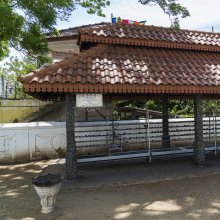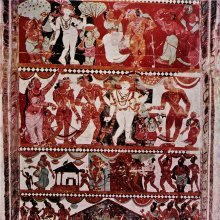Sabhapati, Sabhāpati, Sabha-pati: 12 definitions
Introduction:
Sabhapati means something in Hinduism, Sanskrit. If you want to know the exact meaning, history, etymology or English translation of this term then check out the descriptions on this page. Add your comment or reference to a book if you want to contribute to this summary article.
Images (photo gallery)
In Hinduism
Purana and Itihasa (epic history)
Source: archive.org: Puranic EncyclopediaSabhāpati (सभापति).—A prince who took the side of the Kauravas and fought against the Pāṇḍavas. Mention is made in Mahābhārata, Karṇa Parva, Chapter 89, Śtanza 64, that this prince was killed by Arjuna.

The Purana (पुराण, purāṇas) refers to Sanskrit literature preserving ancient India’s vast cultural history, including historical legends, religious ceremonies, various arts and sciences. The eighteen mahapuranas total over 400,000 shlokas (metrical couplets) and date to at least several centuries BCE.
Languages of India and abroad
Sanskrit dictionary
Source: DDSA: The practical Sanskrit-English dictionarySabhāpati (सभापति).—
1) the president of a society, chairman.
2) the keeper of a gaming-house.
Derivable forms: sabhāpatiḥ (सभापतिः).
Sabhāpati is a Sanskrit compound consisting of the terms sabhā and pati (पति). See also (synonyms): sabhānāyaka.
Source: Cologne Digital Sanskrit Dictionaries: Edgerton Buddhist Hybrid Sanskrit DictionarySabhāpati (सभापति).—epithet of Brahman; rationalization of Sahā- pati, q.v.: MPS 31.76.
Source: Cologne Digital Sanskrit Dictionaries: Shabda-Sagara Sanskrit-English DictionarySabhāpati (सभापति).—m.
(-tiḥ) 1. The keeper of a gaming-house. 2. The president of an assembly. E. sabhā an assembly, (of gamblers, &c.) pati master.
Source: Cologne Digital Sanskrit Dictionaries: Benfey Sanskrit-English DictionarySabhāpati (सभापति).—m. 1. the president of an assembly. 2. the keeper of a gaming-house.
Sabhāpati is a Sanskrit compound consisting of the terms sabhā and pati (पति).
Source: Cologne Digital Sanskrit Dictionaries: Cappeller Sanskrit-English DictionarySabhāpati (सभापति).—[masculine] president of an assembly.
Source: Cologne Digital Sanskrit Dictionaries: Aufrecht Catalogus CatalogorumSabhāpati (सभापति) as mentioned in Aufrecht’s Catalogus Catalogorum:—Dhāraṇalakṣaṇa Sv.
Source: Cologne Digital Sanskrit Dictionaries: Monier-Williams Sanskrit-English Dictionary1) Sabhāpati (सभापति):—[=sabhā-pati] [from sabhā] m. the president of an assembly or council, [Vājasaneyi-saṃhitā; Kathāsaritsāgara] etc.
2) [v.s. ...] Name of Bhūta-karman, [Mahābhārata]
3) [v.s. ...] of an author, [Catalogue(s)]
Source: Cologne Digital Sanskrit Dictionaries: Yates Sanskrit-English DictionarySabhāpati (सभापति):—[sabhā-pati] (tiḥ) 2. m. The president of an assembly; the keeper of a gaming house.
[Sanskrit to German]
Sanskrit, also spelled संस्कृतम् (saṃskṛtam), is an ancient language of India commonly seen as the grandmother of the Indo-European language family (even English!). Closely allied with Prakrit and Pali, Sanskrit is more exhaustive in both grammar and terms and has the most extensive collection of literature in the world, greatly surpassing its sister-languages Greek and Latin.
Kannada-English dictionary
Source: Alar: Kannada-English corpusSabhāpati (ಸಭಾಪತಿ):—[noun] = ಸಭಾಧ್ಯಕ್ಷ - [sabhadhyaksha -] 2.
Kannada is a Dravidian language (as opposed to the Indo-European language family) mainly spoken in the southwestern region of India.
Nepali dictionary
Source: unoes: Nepali-English DictionarySabhāpati (सभापति):—n. a president; chairman (of a meeting/organization/party);
Nepali is the primary language of the Nepalese people counting almost 20 million native speakers. The country of Nepal is situated in the Himalaya mountain range to the north of India.
See also (Relevant definitions)
Partial matches: Sabha, Paati, Pati.
Starts with: Sabhapatilakshana, Sabhapatimalamantra, Sabhapativilasa.
Query error!
Full-text: Upasabhapati, Sabhapativilasa, Sabhapata, Sabhapatilakshana, Udbhata, Dharanalakshana, Sabhadhyaksha, Capapati, Sabha-nayaka, Jayapida, Lalita, Rajashekhara, Sahapati, Nagesha.
Relevant text
Search found 15 books and stories containing Sabhapati, Sabhāpati, Sabha-pati, Sabhā-pati; (plurals include: Sabhapatis, Sabhāpatis, patis). You can also click to the full overview containing English textual excerpts. Below are direct links for the most relevant articles:
Garga Samhita (English) (by Danavir Goswami)
Verse 8.13.115 < [Chapter 13 - A Thousand Names of Lord Balarāma]
Verse 8.13.116 < [Chapter 13 - A Thousand Names of Lord Balarāma]
Middle Chola Temples (by S. R. Balasubrahmanyam)
Sabhapati-mandapa < [Tanjavur/Thanjavur (Rajarajesvaram temple)]
Appendix on Rajarajesvaram: Later History < [Tanjavur/Thanjavur (Rajarajesvaram temple)]
The Temple: a Composite Plan < [Tanjavur/Thanjavur (Rajarajesvaram temple)]
Later Chola Temples (by S. R. Balasubrahmanyam)
Appendix: Naralokavira’s Chidambaram Inscription < [Chapter II - Temples of Kulottunga I’s Time]
Kavyamimamsa of Rajasekhara (Study) (by Debabrata Barai)
Part 2 - Life and Date of Rājaśekhara < [Chapter 1 - Introduction]
Appendix 1 - Ācārya, Kavi and important persons mentioned in the Kāvyamīmāṃsā
Rudra-Shiva concept (Study) (by Maumita Bhattacharjee)
2. Vājasaneyi-saṃhitā (h): Epithets of different beings and tribes < [Chapter 2 - Rudra-Śiva in the Saṃhitā Literature]
1. Epithets of Rudra-Śiva tracked in the Saṃhitā literature < [Chapter 6b - Epithets (References)]
Yajnavalkya-smriti (Vyavaharadhyaya)—Critical study (by Kalita Nabanita)
Chapter 5.15 - Laws Relating to Gambling and Betting < [Chapter 5 - Modern Indian Laws reflected from the Vyavahārādhyāya]
Related products



